Colonialism is generally considered something that we are past or post, as historical or theoretical. Cultural theorist Stuart Hall described colonialism as the ‘outer face’ of Western modernity from 1492 on, its features expansion, conquest and hegemonisation.
Australia’s modern-day mask looks an awful lot like colonialism, many of the pieces in this edition observe; the opening lines of Ali Cobby Eckermann’s ‘The Apology Day Breakfast’, for instance:
my mother did not grow up
with her mother I did not
grow up with mine my son
did not grow up with me
White Australians, Aileen Moreton-Robinson has argued, possess a ‘belonging derived from ownership as understood within the logic of capital’. Thus the founding myth that colonisers came to this country and built and grew and from this land wrung profit.
There is a powerful resistance to this narrative – there always has been – as the Uluru Statement from the Heart, the outcome of the recent Referendum convention, shows:
Our Aboriginal and Torres Strait Islander tribes were the first sovereign Nations of the Australian continent and its adjacent islands, and possessed it under our own laws and customs.
This our ancestors did, according to the reckoning of our culture, from the Creation, according to the common law from ‘time immemorial’, and according to science more than 60,000 years ago.
We live in a country that has no treaty with its First Nations people; where the notion of ‘invasion’ is considered controversial; that celebrates this invasion, and does nothing to mark the enormous cost of the Frontier Wars; that debates decolonialism in the academy and at conferences, while Indigenous communities are left to face, largely alone, the brutal Intervention, the insatiable mining companies, and a judicial system that incarcerates Indigenous youths at monstrous rates.
Colonial history lingers, but so, too, does living resistance, as the writing in this edition, such as Evelyn Araluen’s essay ‘Resisting the institution’, as well as her Nakata Brophy Prize-winning story ‘Muyum: a transgression’, make clear.
Read the rest of Overland 227
If you enjoyed this piece, buy the issue




